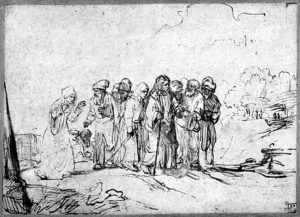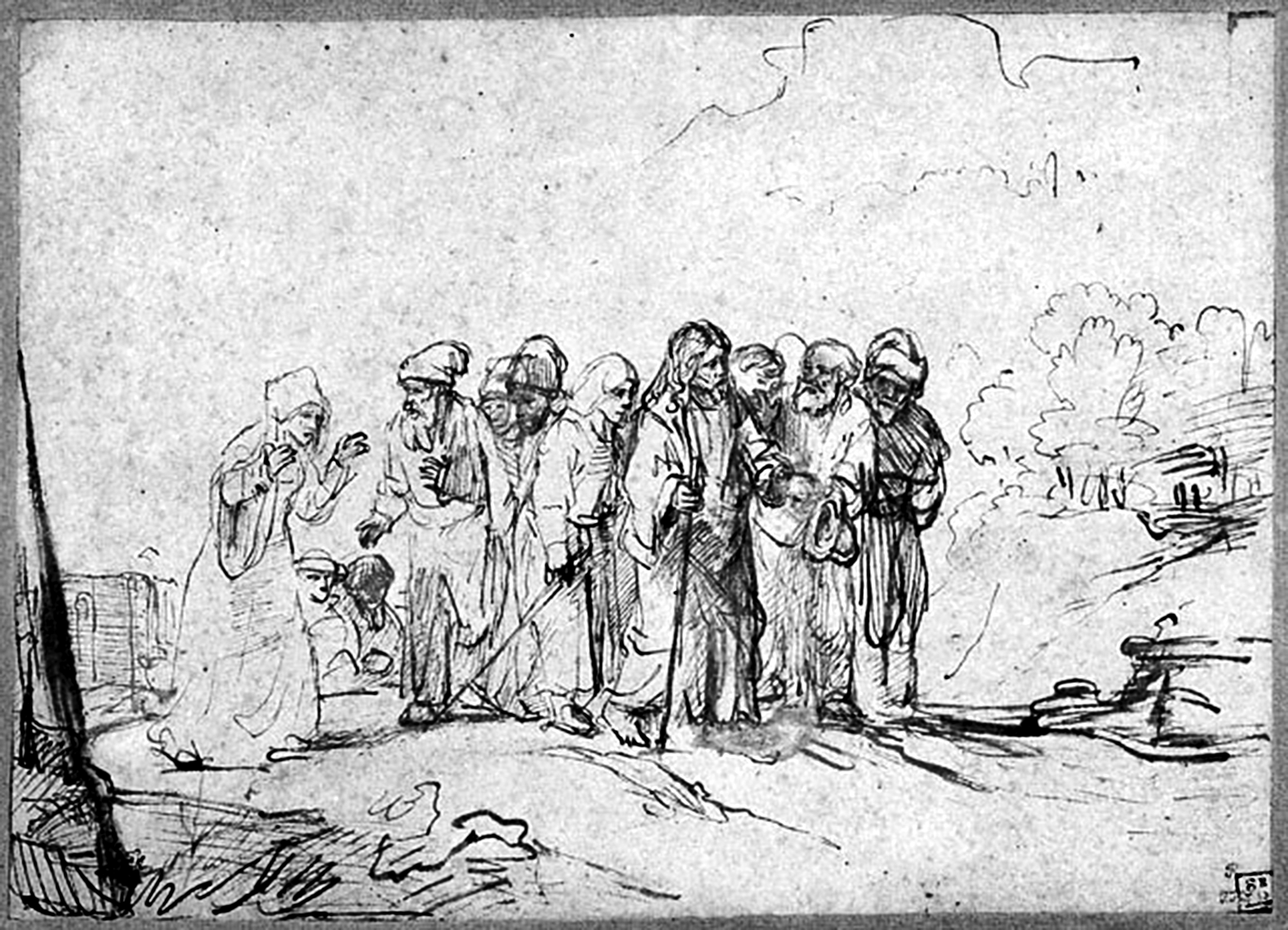
“Christ and the Canaanite Woman”
The J. Paul Getty Museum, Los Angeles
Central idea: Salvation for all. Doctrine: The power of invocation with sincere faith. Practical application: Pray with filial boldness.
Lectionary 118.
A Doctrinal Homily Outline for Lectionary 118 focusing on justice can be found here.
Central idea: Salvation for all
Reading 1 Is 56:1, 6-7
Thus says the LORD:
Observe what is right, do what is just;
for my salvation is about to come,
my justice, about to be revealed.The foreigners who join themselves to the LORD,
ministering to him,
loving the name of the LORD,
and becoming his servants—
all who keep the sabbath free from profanation
and hold to my covenant,
them I will bring to my holy mountain
and make joyful in my house of prayer;
their burnt offerings and sacrifices
will be acceptable on my altar,
for my house shall be called
a house of prayer for all peoples.
- The prophet Isaiah looks forward to the coming of Jesus Christ, the fullness of God’s Salvation and Justice.
- This salvation is not just for Jews, the Chosen People, but for everyone who does what is right.
- Most of us trace our religious origins to pagan converts to the New Covenant established by Christ.
- With the indispensable help of grace, we try to love God and serve him, keeping all the Commandments.
- The holy mountain for us is every Catholic Church where we offer our own sacrifices in union with the great Sacrifice of the Mass.
- Each Catholic Church is “ house of prayer for all peoples.” The most ethnically and culturally diverse institution in the history of the world is the Catholic Church.
Responsorial Psalm Ps 67:2-3, 5, 6, 8
R. O God, let all the nations praise you!
May God have pity on us and bless us;
may he let his face shine upon us.
So may your way be known upon earth;
among all nations, your salvation.May the nations be glad and exult
because you rule the peoples in equity;
the nations on the earth you guide.May the peoples praise you, O God;
may all the peoples praise you!
May God bless us,
and may all the ends of the earth fear him!
- The psalm reminds us that God’s salvation is for everyone on earth, though it begins with the Jews.
- The joy of receiving God’s pity, blessing, light, forgiveness, and justice is everyone’s legacy. Everyone should feel a reverential fear of Him.
Reading 2 Rom 11:13-15, 29-32
Brothers and sisters:
I am speaking to you Gentiles.
Inasmuch as I am the apostle to the Gentiles,
I glory in my ministry in order to make my race jealous
and thus save some of them.
For if their rejection is the reconciliation of the world,
what will their acceptance be but life from the dead?For the gifts and the call of God are irrevocable.
Just as you once disobeyed God
but have now received mercy because of their disobedience,
so they have now disobeyed in order that,
by virtue of the mercy shown to you,
they too may now receive mercy.
For God delivered all to disobedience,
that he might have mercy upon all.
- Led by the Holy Spirit, Paul turned from evangelizing Jews to proclaiming the Gospel to pagans.
- As St. Thomas Aquinas pointed out, God only permits evil because he can draw a greater good out of it. God has permitted both Jews and Gentiles to disobey God so that God can show his mercy. God used Christ’s rejection by his own people to reconcile the world to God and to offer eternal life to everyone who wishes to have it.
Gospel Mt 15:21-28
At that time, Jesus withdrew to the region of Tyre and Sidon.
And behold, a Canaanite woman of that district came and called out,
“Have pity on me, Lord, Son of David!
My daughter is tormented by a demon.”
But Jesus did not say a word in answer to her.
Jesus’ disciples came and asked him,
“Send her away, for she keeps calling out after us.”
He said in reply,
“I was sent only to the lost sheep of the house of Israel.”
But the woman came and did Jesus homage, saying, “Lord, help me.”
He said in reply,
“It is not right to take the food of the children
and throw it to the dogs.”
She said, “Please, Lord, for even the dogs eat the scraps
that fall from the table of their masters.”
Then Jesus said to her in reply,
“O woman, great is your faith!
Let it be done for you as you wish.”
And the woman’s daughter was healed from that hour.
- Jesus with his disciples has withdrawn for a time to pagan territory, although there were likely some Jews there, as there were all over the Roman Empire and Middle East.
- Somehow this Canaanite woman knew who Christ was: the “Lord, Son of David.”
- She is very persistent and probably loud, “in their face” annoying, with her cries for help for her daughter.
- Jesus declares he “was sent only to the lost sheep of the house of Israel.” Elsewhere he affirms that he only does the will of the Father. These two statements would seem to mean that it was not the Father’s will that the Son do anything for pagans. This cannot be true, for due to her great faith, Christ heals the woman’s daughter.
- From this we can understand that the Father’s will was really for the salvation of the whole world, which is why Jesus gave the apostles his Great Commission after his Resurrection to go and make disciples of all nations.
Doctrine: The power of invocation with sincere faith
- The Canaanite woman boldly spoke to Jesus. Jesus “teaches us filial boldness.” That is, we should speak to God the way the son or daughter of a good father would, with confidence and candor. (CCC 2610)
- This could be hard for someone who did not grow up with a good father or who was used to being told “no,” over and over. But Christ explains how to do it: “Whatever you ask in prayer, believe that you receive it, and you will.” This can be true because “all things are possible to him who believes” (CCC 2610).
- Filial boldness in prayer means to pray with a faith that refuses to doubt. “Jesus is as saddened by the ‘lack of faith’ of his own neighbors and the ‘little faith’ of his own disciples as he is struck with admiration at the great faith of the Roman centurion and the Canaanite woman.” (CCC 2610)
- Despite the fact that Our Lord tests the woman by referring to her and her daughter as dogs, and regardless of the fact that His mission is “only to the lost sheep of the house of Israel,” the pagan woman’s persistence and insistence make God, as it were, change his will.
Practical application: Pray with filial boldness
- Christ gives us permission to petition God with filial boldness.
- Prayer of petition is informing God what we want so he can give it to us. This means that we can ask God for anything with a faith that refuses to doubt. Of course, we cannot ask for something evil in itself or bad for us and expect to be heard. We also cannot expect that we will get what we ask for according to our schedule, but we can certainly pray that way. We will eventually get everything in heaven, if we make it there.
- Likewise we can make acts of thanksgiving with filial boldness. This means we can thank Him for anything that is not sinful. There are many humble things we can be thankful for that would we would not say aloud, but God is pleased with this gratitude.
- Prayer of reparation or atonement can also be made with filial boldness. A humble child with confidence in his or her parents would not be afraid to name what he has done, no matter how embarrassing. We can also boldly express sorrow to God for all the evils we see around us.
- Finally, we can boldly adore God. I think this particular kind of boldness is mostly necessary when we are with or around other people. It can take courage to make the sign of the cross when passing a Church, or to pray a Hail Mary aloud when passing an accident scene, or to genuflect before the Blessed Sacrament.
The Homiletic Directory recommends the following Catechism points and themes for the Twentieth Sunday in Ordinary Time:
- CCC 543-544: Kingdom first to Israel, now for all who believe
- CCC 674: Christ’s coming hope of Israel; their final acceptance of Messiah
- CCC 2610: power of invocation with sincere faith
- CCC 831, 849: the catholicity of the Church

Leave a Reply